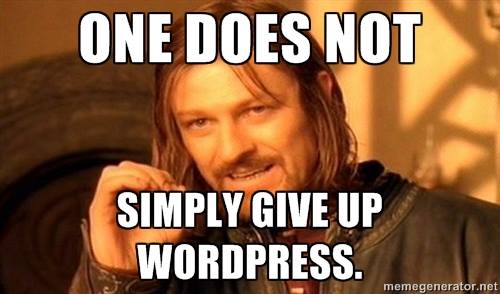 I’ve dealt with a lot of clients throughout the years. It’s not new that I design exclusively with WordPress for websites. It’s also not new that I offer services to convert other platforms and content management systems (ex: Drupal, Joomla, Blogger, etc…) over to WordPress.
I’ve dealt with a lot of clients throughout the years. It’s not new that I design exclusively with WordPress for websites. It’s also not new that I offer services to convert other platforms and content management systems (ex: Drupal, Joomla, Blogger, etc…) over to WordPress.
What I’ve also dealt with is competing for a proposal for a project against bigger design firms. But, who cares about my background in WordPress, my background in PHP, or my background in other CMS. The fact of the matter is that there are people actually telling people to stop using WordPress, and giving inaccurate information to the public.
Like Chris Lema, I agree that telling people to stop using WordPress IS ridiculous.
I was reading Medium’s article on “Why we don’t use WordPress anymore“, and it reminded me of when I did digging with a city in New Mexico to find out the other competing design firms were, what they were offering, and how much their bid was.
Aside from the fact that the city had very simple needs for their website, the firm wanted to charge $40,000, plus a retainer fee, and put it on Drupal because it was the “best choice.” I wasn’t satisfied by that answer.
I then dug deeper into that firm’s public portfolio, and discovered why… they only worked with Drupal. However, when I called them to ask about it, especially on why not recommending WordPress when asked by the constituents of the city during a city council town hall meeting, they said “We don’t work with WordPress because it’s not user-friendly.”
Wait! WordPress isn’t user-friendly? With WordPress being the #1 CMS, and powering nearly a quarter of the websites that exist online today, AND growing, there’s a lot to be said about WordPress.
Now, I’m not saying people should jump on the WordPress bandwagon just because all the cool kids have. I’m saying that you should actually take WordPress for a spin. Poke at it, try plugins, and see if it is something you’d work with.
Also, the issue of security came up. While I’m not as eloquent, Chris Wallace of UpThemes was definitely on the ball with his comment in the Medium article.
Using poor plugins/themes leads to poor performance. If you install plugins and themes that a client specifically “asked for” you are opening yourself up to possible security issues, slowness, PHP warnings/errors, and non-performant code. This is a downside, but if you control the code that gets deployed to a client’s WordPress site, you should force them to use plugins and themes you have specifically tested, code reviewed and optimized for the client’s use case. Installing crap plugins leads to a crap website. That’s not on WordPress, that’s on you. Educate clients and only use trusted plugins and you won’t run into as many issues with performance.
In fact, Chris Wallace addresses a lot of the points said in the article that make an excellent case on the reasons given in the article were not fully formed opinions, and not very accurate information.
Now, WordPress could in some cases, actually not be the solution for you. You may need a lot of extensive work or have needs that may be better met using some other platform. Just, the next time you see someone bagging on WordPress, find out all the facts. In fact, no matter the platform, find out all the facts.
As for the article on Medium, the majority of the points mentioned, have a valid solution. For the client, they care if their website will work, and make them money. They often don’t care how the website was made.
That being said, it’s important for the designer or developer to have an optional plan added as part of their scope that addresses the HUGE elephant in the house: on how to actually use WordPress. With so many video tutorials out there available, it’s pretty easy to get that information together.
Remember that no matter how you get it done, the client is going to either have to be able to use it or hire someone that can be trained to use the website. If the client asks about WordPress, give them what they asked for unless it truly isn’t a solution that will work for their project.
And circling back to our Medium blog post, writing an article to the world on how you don’t use WordPress, and listing inaccurate information makes you sound like a real boob.
Don’t be a boob. Get your facts straight. 😉

Hey Nile,
In my opinion, WordPress is more user-friendly than Drupal. I’m totally basing this comment with my experience. I have tried using both platforms and it’s clear to me which is more user-friendly among the two. As a proof, all my sites are with WordPress and so far, all of them are running smoothly. In the case of WordPress sites that are not working properly, I simply agree that it’s site developers fault not securing the right plug-ins to install nor use the right code to properly enhance the site. They shouldn’t put the blame on WordPress itself since the platform has already given them the right amount of help they need. It’s already there responsibility to make everything work and ensure that everything is fine. That is why they are paid for in the first place right?
Thanks for having this post Nile. It certainly needs to be share in order for others to know which facts are straight and which are not when it comes to WordPress. 🙂
I agree with you. I tried Drupal and realized that it is not as user friendly as WordPress even for tech savvy guy like me. Drupal comes in pretty barebone and you have to hook up modules after modules to make it have the features that WordPress already comes and that process is a lot more error prone.
It took me awhile to transition over to WordPress as a development platform. I had only used it as my blog host for many years but became convinced to use it for site development when I began to understand how user-friendly it truly was. The ability to incorporate a few powerful plugins and widgets with relative ease made creating a site with all the bells and whistles I or a client desired that much easier. I have however learned first-hand that some of the plugins are poor quality when it comes to security and performance but now I am more careful about researching specific plugins before incorporating them. Overall I agree that WordPress is a great choice for website development. And yes indeed, “don’t be a boob. Get the facts straight”!! 🙂
Hello Nile, your title on this post drew me right in and the ending had me laughing hyestrically hehe You certainly have a way with words my friend.
I do agree before you share anything you should always be sure you have the accurate information, you certainly dont want to be a BOOB! LOL
TRUE–>>Get your facts straight..
Great Share.. Thanks Chery :))
Hello Nile..
In my opinion, WordPress is more user-friendly than Drupal. WordPress 4.2.2 is now available. This is a critical security release for all previous versions and we strongly encourage you to update your sites immediately. Version 4.2.2 addresses two security issues: The Genericons icon font package, which is used in a number of popular themes and plugins,..